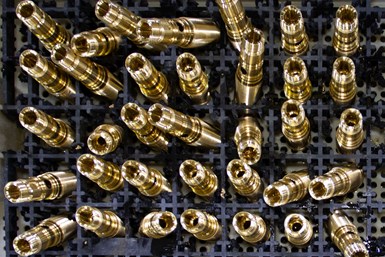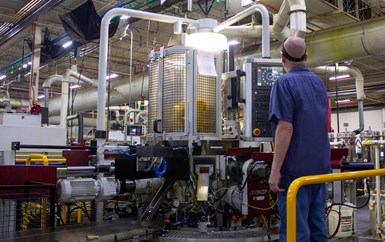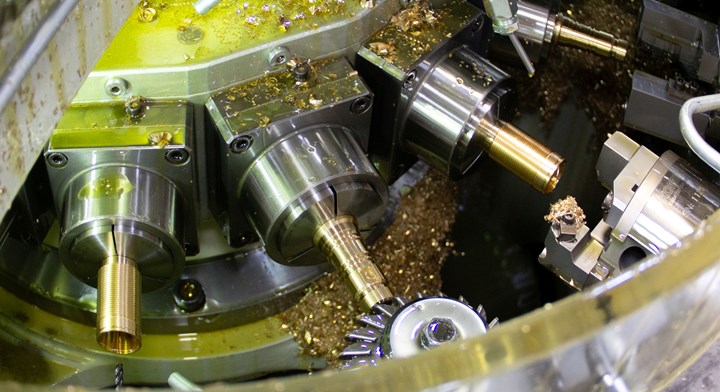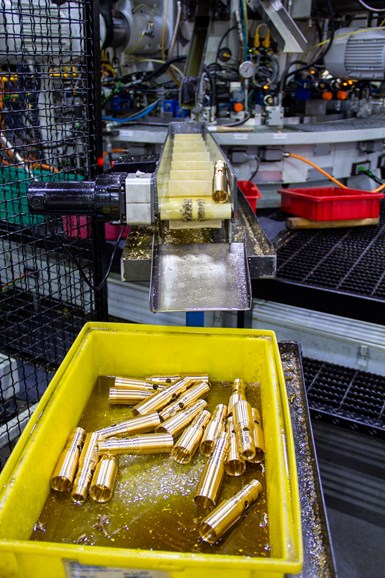
Adding new CNC rotary transfer technology for its new generation of valves for Widespread faucets aligned Moen’s plan to onshore production. (Photo credits: Hydromat)
In the world of faucets, Moen stands as a proponent of innovation and quality. An important component of Fortune Brands Innovation, Moen is included in the lineup of brands alongside Master Lock, House of Rohl, Therma Tru and Larson. A significant player in the wholesale market, Moen dominates with a staggering 63% of new construction projects featuring its products.
The journey through Moen’s production process begins at its expansive Sanford, North Carolina plant, a 350,000 square-foot facility spread across eight acres under one roof. It’s a testament to the brand’s commitment to vertical integration. The plant operates 24/5, and its intricate machinery produces an impressive 700,000 parts per day. Here, injection molding, machining, assembly and testing unite to craft the final product. And all this is managed seamlessly by a workforce that has grown from a humble seven employees in 1973 to 250 today.
Featured Content
Moen’s diverse range of machining equipment at its Sanford plant boasts a variety of brands, including Hydromat, Acme, Buffolli, Davenport and a mix of older CNC lathes. The introduction of Hydromat technology in support of its shark valve body back in 1995 further marked a milestone in Moen’s journey.

Danny Mooneyhan, Moen setter/team lead, adjusts the Epic HF program on one of the two new Epic rotary transfer machines.
Moen Points to a Key Player in the Evolution
The transition from legacy rotary transfer machines to new-generation Hydromats, such as the Epic HF machines, isn’t without its challenges. For Andrew Tyo, Moen’s senior manager of engineering, it’s been a transformative journey. Having encountered Hydromats early in his career, Tyo’s experience ranges from legacy to modern iterations, including CNC technology. When he joined Moen in 2009, the company had a mix of legacy machines and an NT Hydromat. Tyo, along with others part of Moen’s management team, recognized the need for new technology, which eventually led to their collaboration with Hydromat.
The pivotal moment arrived with Moen’s decision to adopt CNC rotary transfer technology for its new generation of valves for Widespread faucet, which aligned Moen’s plan to onshore production. “This was a significant shift from outsourcing,” Tyo says. “Making it 100% domestically produced was a big deal for us.”

Since the adoption of new CNC rotary transfer machines, Moen has seen a 40% improvement in cycle time for valves for its Widespread faucets.
Moen originally launched the product using equipment from a company that rebuilt Hydromats. Unfortunately, the cycle times and overall equipment effectiveness were unable to reach the level needed to be able to support Moen’s customers. The product is a challenging part made from a low-lead brass with approximately one pound of chip removal per part and several complex geometries. Collaboration resulted in a solution that met both the volume needs of Moen’s customers and the capital plans of the business.
The recent relationship between Moen and Hydromat was forged with the support of sales agent Crotts and Saunders, part of the HEH Group’s family of companies. “Moen’s decision to align with Hydromat was driven by their dedication to excellence and the need for a reliable machining solution,” says Willie Eichele, president of the HEH Group. “Our team at Crotts and Saunders understood Moen’s specific requirements and collaborated closely with Hydromat to ensure they received the right technology for the job.”
Moen’s transition to the new generation of Hydromats, the Epic HF machines, has yielded significant results. Since the adoption of these machines, Moen has seen a 40% improvement in cycle time, enhancing its production efficiency significantly.

Here are finished faucet valves collected off the Epic HF 32/45-16. These valves will move to the injection molding process then to assembly and testing.
Prior to implementing the new Epic HF machines, the six-month average of the performance to rate ratio on the rebuilt Hydromat was 32%. In comparison, the six-month average of the performance to rate ratio on both Hydromat Epic HF machines increased to 71%.
Danny Mooneyhan, setter/team lead with 34 years of Moen experience, says transitioning from what he had known his entire career in legacy Hydromats to Epic HF machines wasn’t without its challenges. However, with Hydromat’s support, he says he navigated the learning curve with confidence. The initial training at the machine runoff and subsequent guidance from setup technicians ensured a smooth shift to the new technology.
Support has been the bedrock of this success story. Moen’s weekly interactions with Hydromat’s customer service reflect an open channel of communication. Mooneyhan emphasizes the significance of Hydromat’s 24/7 support, ensuring that issues are addressed promptly.
Matthias Walter, Hydromat president, visited Moen shortly after the delivery of the first Epic HF machine, reinforcing its commitment to Moen’s success. “Matthias came to visit two weeks after the first Epic machine was delivered,” Mooneyhan explains. He stepped up on the platform of the machine and made the comment to me, ‘We have your back. Anything you need, we have your back.’ That made me feel good about the long term.”
With Moen’s two new Hydromat Epic HF machines, controls are described as user-friendly, which led to operators adapting to them quickly. The double-index feature came with a learning curve, but the user-friendly controls of the machine made it more intuitive to learn. At the time of implementing the new Hydromats, Moen had machine operators with CNC experience and associates who were new to the technology. Both groups adapted and learned the FANUC control system.
Bobby Cassidy, Moen’s production manager who has been with the company for 18 years and once had a negative experience with a rotary transfer machine in the past, is a champion of the new Hydromat machines. He says, “We were prepared to have a much bigger learning curve, and it surprised us.”
RELATED CONTENT
-
Automated Manufacturing in the U.S. Makes for a Fitting Process
An Australian company has been able to speed delivery of its popular plumbing products to U.S. customers by adding machining and assembly cells to produce brass fittings in Alabama.
-
As a Business Evolves, So Does its Machining Technology
Gent Machine, now under its fourth-generation of family ownership, has made operational and equipment decisions to position it for continued success moving forward.
-
Beyond One and Done
Rotary transfer machining is one proven solution for high volume machining. Today’s CNC rotary transfer machines provide more than “set it and forget it” production; they are flexible enough for high mix and low volume production demands.






